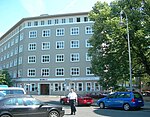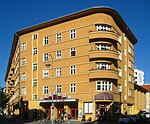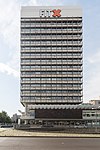Institute for Marxism-Leninism for the Central Committee of the SED
1949 establishments in East Germany1990 disestablishments in East GermanyMarxism–LeninismResearch institutes in BerlinSocialist Unity Party of Germany
The Marx-Engels-Lenin-Institut was a department of the Central Committee of the Socialist Unity Party of Germany (SED), directly subordinate to the secretary of that committee (Fred Oelßner until 1957 and then Kurt Hager until 1989) and named after its earlier equivalent in Moscow. It was set up in East Berlin in 1949, renamed the Marx-Engels-Lenin-Stalin-Institut on Stalin's death in 1953 and the Institute for Marxism-Leninism for the Central Committee of the SED (German: Institut für Marxismus-Leninismus beim Zentralkomitee der Sozialistischen Einheitspartei Deutschlands, or IML) as a result of early de-Stalinization in 1956.
Excerpt from the Wikipedia article Institute for Marxism-Leninism for the Central Committee of the SED (License: CC BY-SA 3.0, Authors).Institute for Marxism-Leninism for the Central Committee of the SED
Torstraße, Berlin Mitte
Geographical coordinates (GPS) Address Website Nearby Places Show on map
Geographical coordinates (GPS)
| Latitude | Longitude |
|---|---|
| N 52.527578 ° | E 13.415605 ° |
Address
Soho House Berlin
Torstraße 1
10119 Berlin, Mitte
Germany
Open on Google Maps









